
Vatican City, Sep 27, 2021 / 09:00 am (CNA).
Pope Francis decried abortion and euthanasia in a speech Monday in which he said that today’s “throwaway culture” leads to the killing of children and discarding of the elderly.
“There is the discarding of children that we do not want to welcome with the law of abortion that sends them to the dispatcher and kills them directly. And today this has become a ‘normal’ method, a practice that is very ugly. It is really murder,” Pope Francis said Sept. 27.
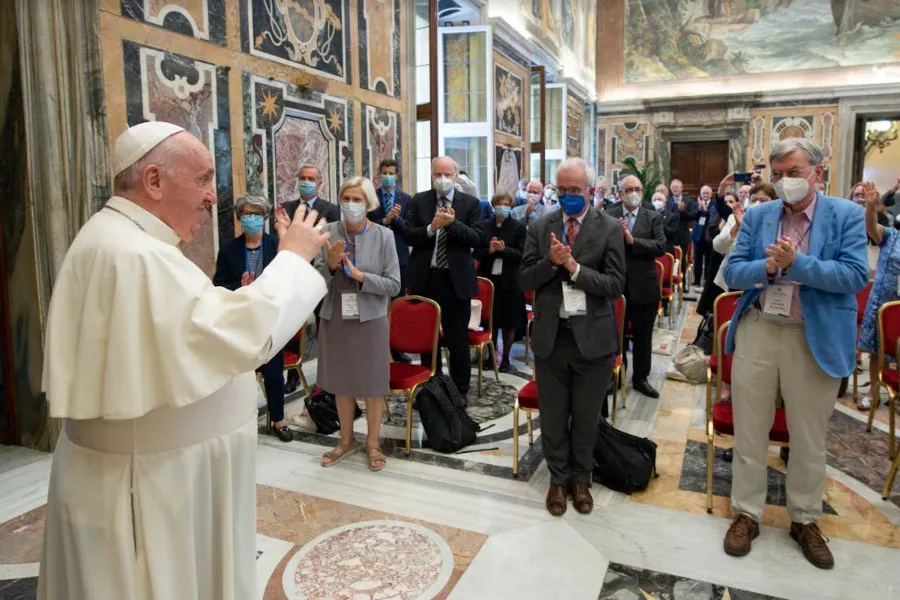
In a live-streamed address to members of the Pontifical Academy for Life, the pope said that to understand what abortion is, it helps to pose two questions.
“Is it right to eliminate, to take a human life to solve a problem? Is it right to hire a hitman to solve a problem? That’s what abortion is,” the pope commented.
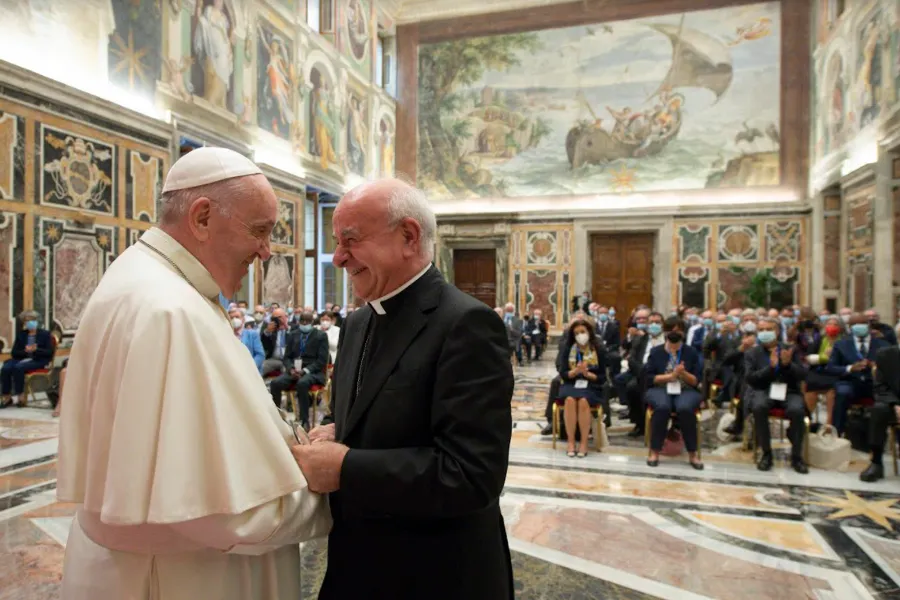
Pope Francis said that the elderly today were also viewed as “waste material” and “of no use” in today’s throwaway culture.
“But they are wisdom. They are the roots of wisdom of our civilization, and this civilization discards them,” he said.
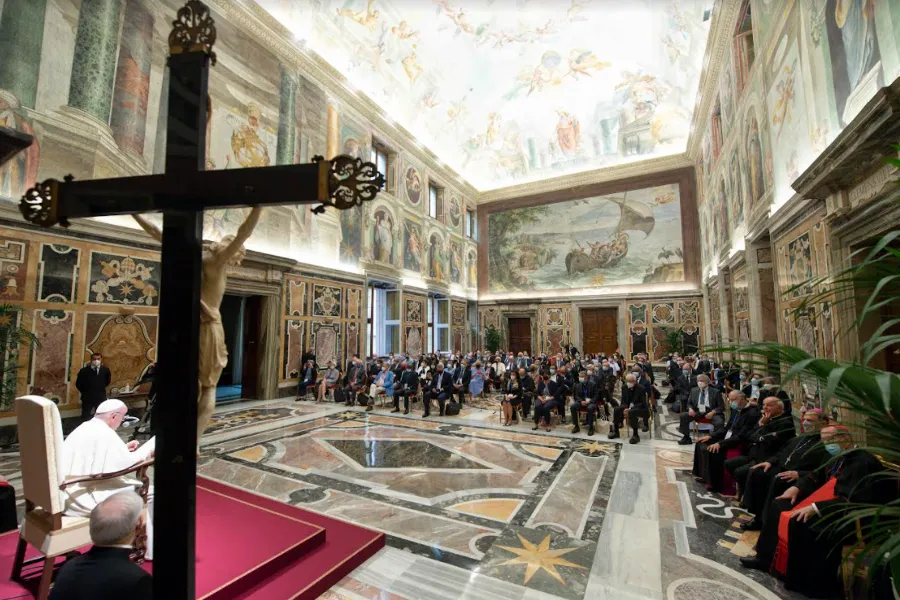
“Yes, in many parts there is also the law of ‘hidden euthanasia,’ as I call it. It is the one that makes people say: ‘Medications are expensive, only half of them are needed,’ and this means shortening the life of the elderly.”
The pope added that both abortion and euthanasia “deny hope” by negating “the hope of children who bring us the life that keeps us going and the hope that is in the roots that the elderly give us.”
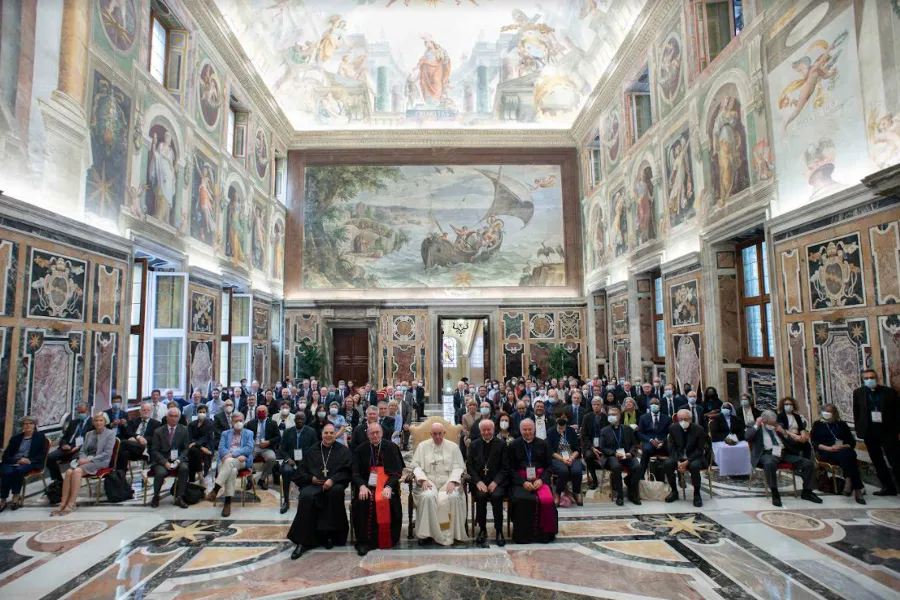
Pope Francis underlined that this was not a path for Catholic universities or hospitals to follow.
“This is a road on which we cannot go: the road of discarding,” he said.
The speech marked the second time this month that Pope Francis has spoken out strongly about abortion.
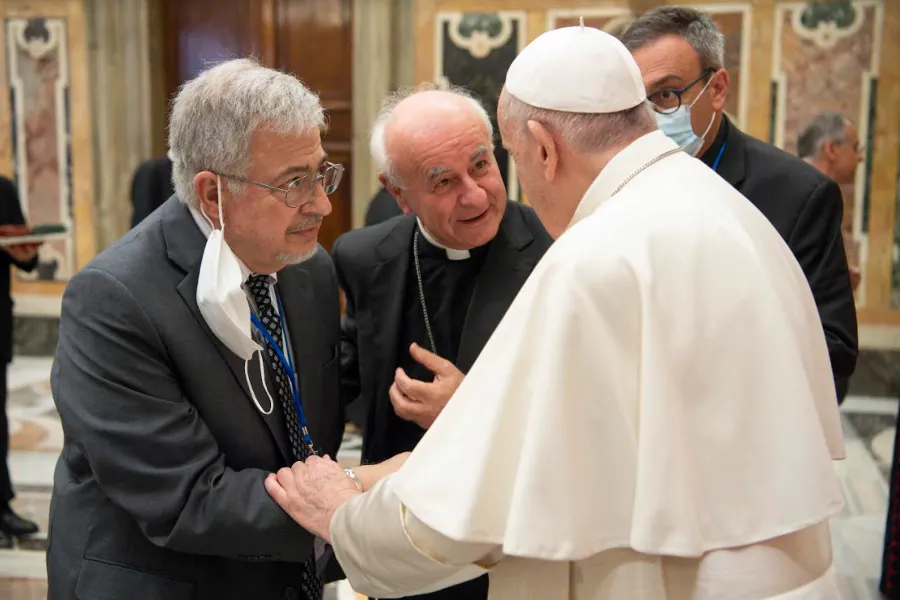
During a press conference on his return flight from Slovakia on Sept. 15, the pope repeatedly said that “abortion is murder” and compared the acceptance of abortion to “accepting daily murder.”
The Pontifical Academy for Life was founded by Pope John Paul II in 1994. It is dedicated to promoting the Church’s consistent life ethic.
This week, the academy is holding its plenary assembly in Rome, focused on the pandemic, bioethics, and the future of public health.
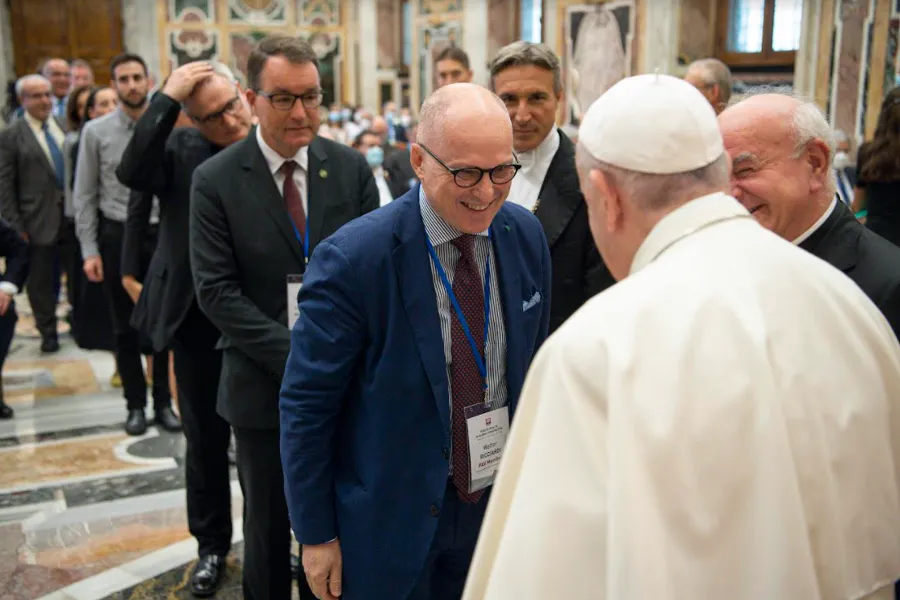
“I entrust to the Virgin Mary the work of this assembly and also the whole of your activity as an Academy for the defense and promotion of life,” Pope Francis said in his speech in the Vatican’s Clementine Hall.
If you value the news and views Catholic World Report provides, please consider donating to support our efforts. Your contribution will help us continue to make CWR available to all readers worldwide for free, without a subscription. Thank you for your generosity!
Click here for more information on donating to CWR. Click here to sign up for our newsletter.





Catholic faithful welcome the strong words, although many do not perceive actions that support such strenuous condemnation. Many of us remain unconvinced. For example, real, live hitmen, Mafia members, in fact all Mafia members were excommunicated by Pope Francis. Then why the withholding of excommunication from Catholic politicians who applaud and legalize government legislation and financial support for abortion, the support for hitmen Planned Parenthood and the like? Why does the Pontiff discourage Catholic prelates who do wish to sanction these politicians? And approve of Archbishop Paglia’s appointment of pro abortion Anglican theologian Nigel Biggar to the Pontifical Academy for Life?. A policy of words sans action that obviously encourages the Catholic laity to vote largely in favor of pro abortion Catholic politicians? If we measure the crime by numbers the aborted infants are infinitely more the victims of murder than Mafia victims. Parity in words doesn’t equate parity in belief, if belief really means to live exactly as we say we believe. Otherwise it’s a lie.
Hope and pray that the Pope’s strong words will further lead him to follow-up with the required strong action in his administration to clean up the Church.
Finally, the Pope is speaking more and more against abortion, and ever more vigorously.
Would that he had done that in the first years of his papacy!!!
The Pope has condemned abortion quite often over the years. I believe that in the early years he might have had a lot of learning to do as a new Pope who had moved in from Argentina.
Mal, re remained silent during the Irish Referendum citing non-interference in internal country affairs. The result was that Catholics perceived he tacitly approved. Then during the US election he openly supported pro-abortion Joe over… interfering and this time with non-tacit approval. Does this resemble honest behavior from a pope, or double-speak from a Free Mason who has a public program but a “hidden” agenda?
Can you prove that our Pope, who is a faithful Catholic and disciple of our Lord, was a freemason? I have seen many such obviously false accusations being made against Pope Francis, and even the Popes before him, and these accusations are kept alive by those who hate Pope Francis.
Catholic faithful welcome the strong words, although many do not perceive actions that support condemnation. Many of us remain unconvinced. For example, Mafia hitmen, indeed all Mafia members were excommunicated by Pope Francis. Then why withhold instruction of the latae sententiae applicability of canon 915 to all Catholic politicians who support even seek to extend abortion? Why does the Pontiff discourage Catholic prelates who do wish to sanction these politicians? And approve of Archbishop Paglia’s appointment of pro abortion Anglican theologian Nigel Biggar to the Pontifical Academy for Life?. A policy of words and no follow-up, except actions that seem to support abortion policy encourage Catholic laity to dismiss doctrine and vote largely in favor of pro abortion Catholic politicians. Parity in words doesn’t equate parity in belief, if belief really means to live exactly as we say we believe.
Pray for wisdom for our Pope that he sees and performs the necessary action to be consistent with his words, and rids the Church of all elements and politicians who support abortion. Give them a chance to renounce abortion and repent. If they do not repent, then they are not Catholics in communion with the Church and, therefore, are not worthy of the Eucharist.
Agreed Ron. I do pray for a just resolution that benefits all.
This second like comment was meant to replace the one above. Ah well, double for the effort. On topic is the challenge of aging and death. Aging is not for the faint of heart (from Thurman Ray Plumlee who wrote Growing Old is Not for the Faint of Heart). Elective euthanasia the easy way out except for judgment and more suffering. Although the pontiff sounds good on the air here, he doesn’t on paper elsewhere. Amoris Laetitia provides the rationale for political expediency based on difficult concrete situations and the primacy of conscience. Moderation, the mitigation of religious rules for sake of societal pluralism. If adultery can be moderately assessed as acceptable why not abortion for the Catholic politician? There is in this an enticing fallacy that subverts [all] revealed moral truth, a religious faux pas. An indiscretion that omits reference to grace, also identified by others in Ch 8. Grace given by Christ exactly to remain faithful within life’s difficult concrete situations. As to growing old I like to look at it other than the cliché a soul trapped in a dying body. Rather an increasingly fine, aging wine ready to be decanted.
It would be interesting to see this latest declaration from the Pope put side by side with another papal soundbite: “I have never refused the Eucharist to anyone.” Let’s wait for the USCCB document coming out this November and check on which one of these statements they will focus their spotlight on or will they give weigh to both? I can’t wait. Even CWR, the rest of the rightist conservative Catholic media, and their constituents, can be weighed in this aspect of their coverage and emphasis of papal tweetable statements to determine their Catholicity, biases, and partisanship.
This is very good news.
(Why is it that with this prelate I am always waiting for the other shoe to drop?)
Those throwaway parts did not go to waste but were in fact essential in the development of the covax
Also euthanasia may one day be our best protection against covid and therefore at that time an ‘act of love’
It’s all coming up roses
Thin gruel.
“treating human life like waste…” Just as Bergoglio did by selling out the Chinese Catholics to their tormentors. Just like he continues to do in embracing the leftist politics of the Democrats Party, globalists, environmentalists, and those who pay homage to the blood stained idol of Pachamama.
Abortion is murder. Murder is evil. Paragraph # 1753 of the Catechism of the Catholic Church states that the end does not justify the means. So, if abortion is murder, and murder is evil, how can an abortion produce the means of a good vaccine for a pandemic? Just asking.
Mal, he remained silent during the Irish Referendum citing non-interference in internal country affairs. The result was that Catholics perceived he tacitly approved. Then during the US election he openly supported pro-abortion Joe over… interfering and this time with non-tacit approval. Does this resemble honest behavior from a pope, or double-speak from a Free Mason who has a public program but a “hidden” agenda? He speaks like a Pope, when there is political gain to be had. In this instance, there are no Stakes at Stake: the referendum passed, Joe was elected.
Dear Pope Francis, your words are encouraging, but they can’t be heard over the din of your, and your hierarchy’s ACTIONS! Don’t expect us to listen to your words and ignore your actions.
Good thing Pope Francis isn’t trying out for Catholic chaplain in a public university.
Are you kidding? Secularists love this guy. Just ask them. A wide range of people hostile to the Catholic faith and to the Gospel LOVE Pope Francis. They are especially good at recognizing double speak and hypocrisy, because they use it themselves.
My allusion escaped you, Timothy.
Timothy – National Catholic Register – English University Accepts Catholic Chaplain Who Tweeted About Abortion.
Cheers.
I am thankful that Pope Francis has spoken out strongly and clearly against the evil that is abortion, and the evil of euthanasia.
Amen. Now that the Pope has once again condemned abortion and euthanasia and declaring that they have excommunicated themselves, it is up to the Bishops and priests to deal with these people as they see fit.
And once again, Francis has taken the easy route by making a public statement that is binding on NO Catholics. In October, he will have a smiling meeting with Biden, and at that time he will say nothing at all about abortion. The emptiness of this papacy is wider and deeper than the Grand Canyon.
Binding on no Catholics? He has made a very clear statement proclaiming that they are EXCOMMINCATED. Just as Jesus called the doctrine-abiding “religious” Pharisees HPOCRITES, without naming a single individual. In fact, our Lord who ate with sinners and drunkards, did not ever condemn a single individual. Why would he? His mission was to SAVE them.
I agree Jesus came to save us sinners. But that doesn’t mean withholding sanctions when needed. As any parent knows, sometimes the most loving thing she can do is discipline her child and/or say “no.” Jesus did give St. Peter and his successors the power to bind. Why give a power if He did not intend it to be used. After N.O. Archbishop Rummel excommunicated local political figures and one mobster for racism, most repented and returned, chastised, to full communion with the Church. He was brave and, IMHO, right. So would be Pope Francis. Not holding my breath, however.